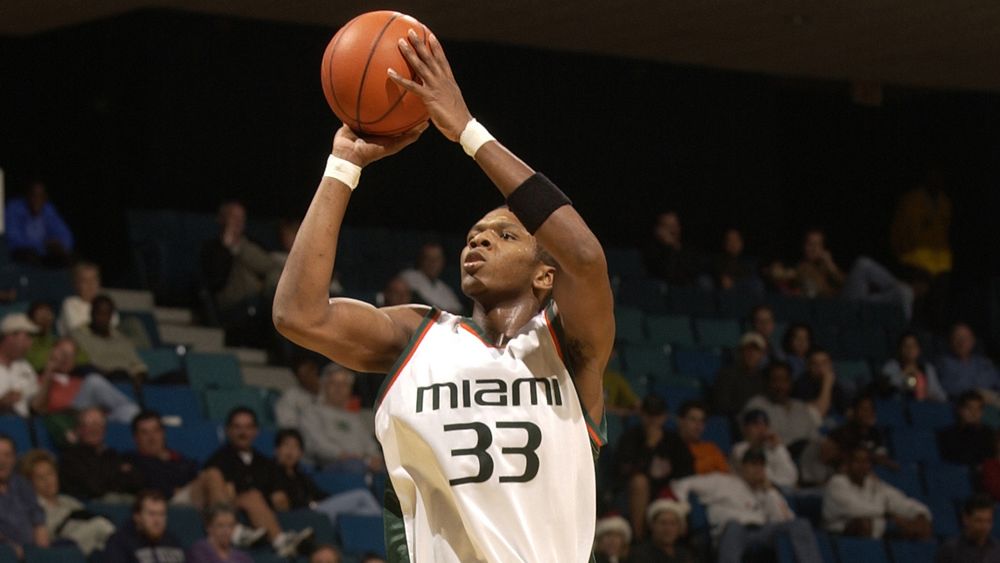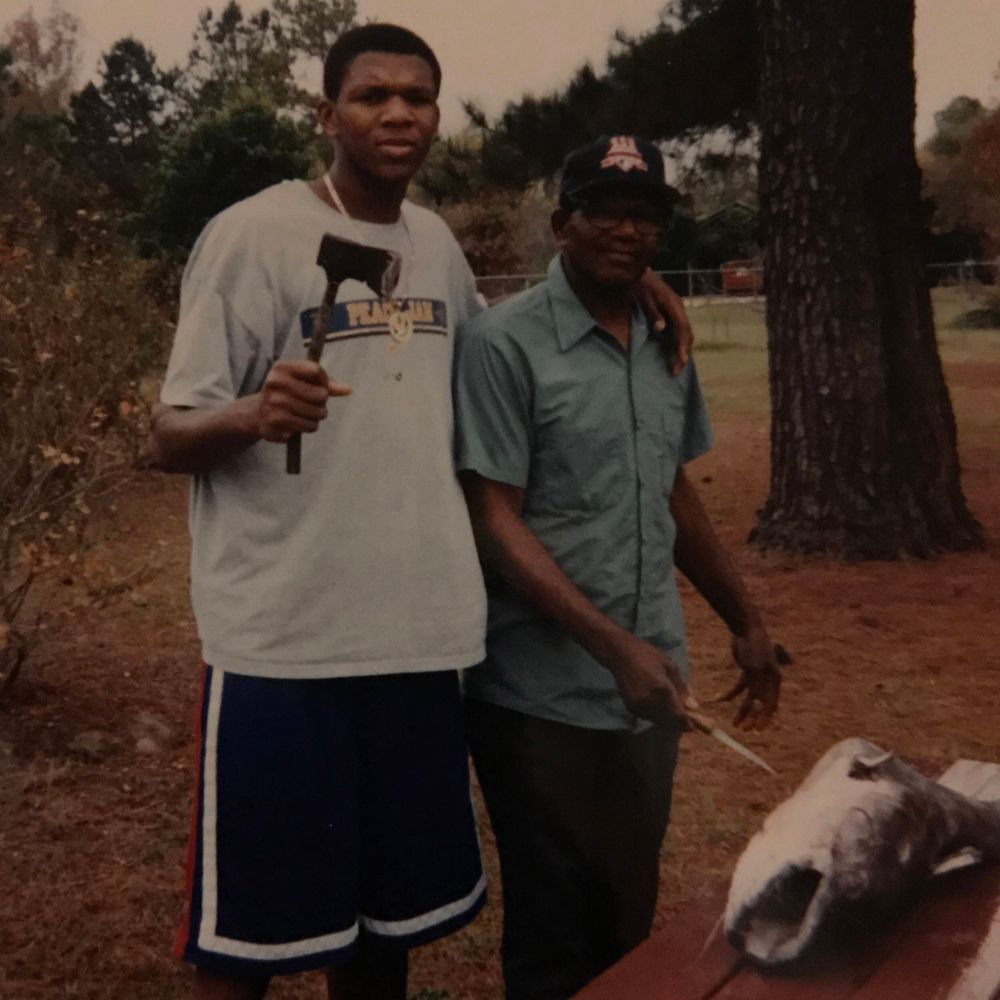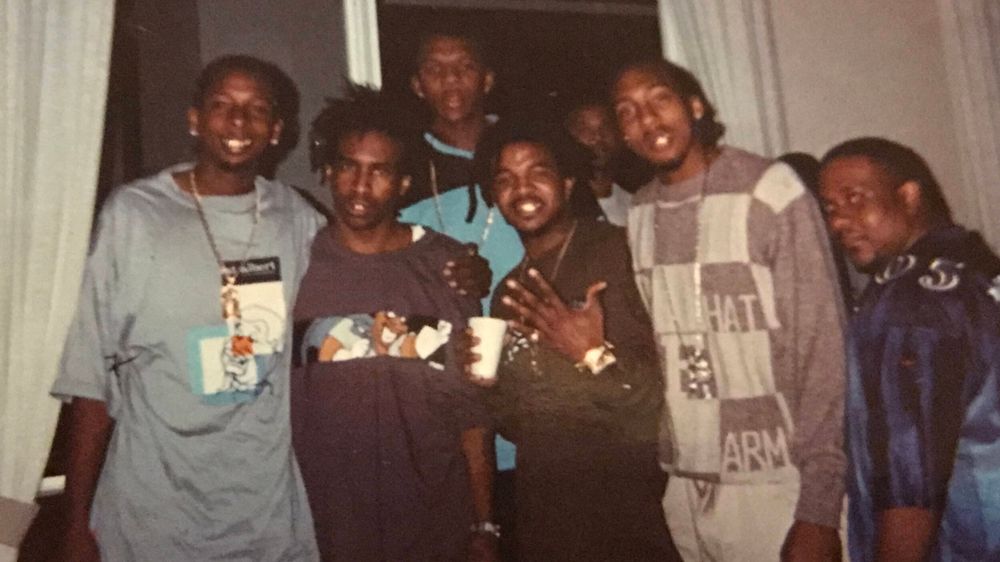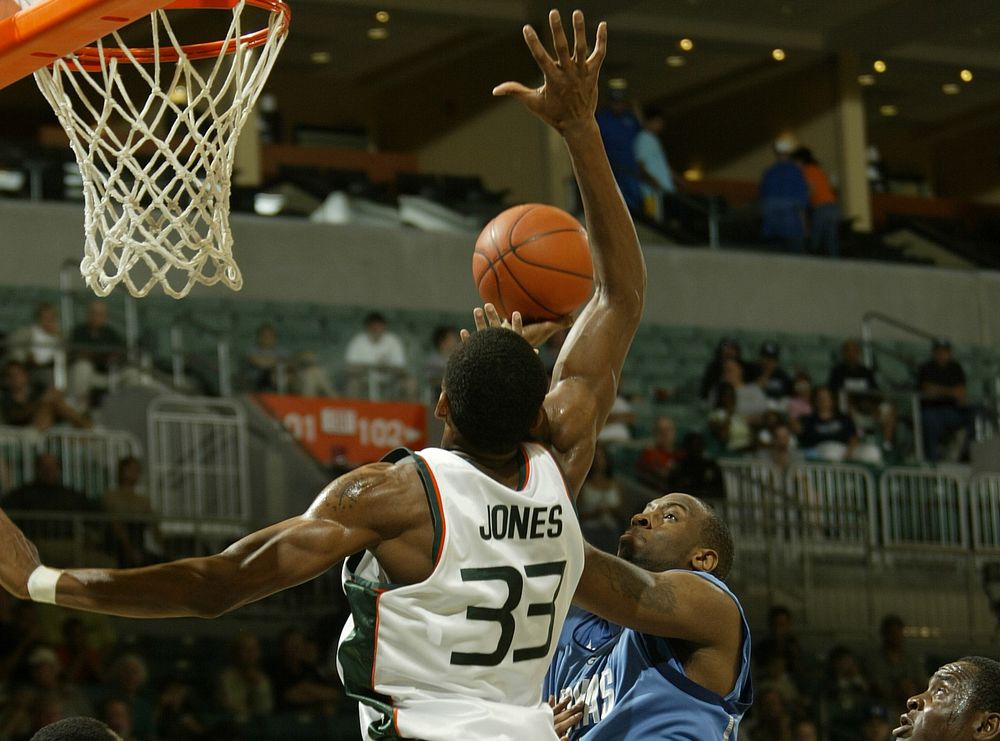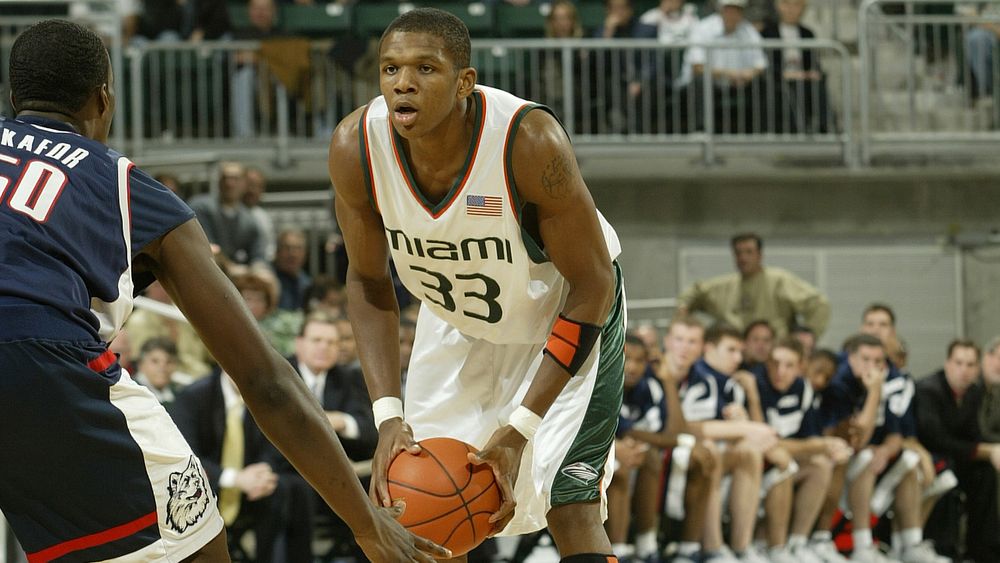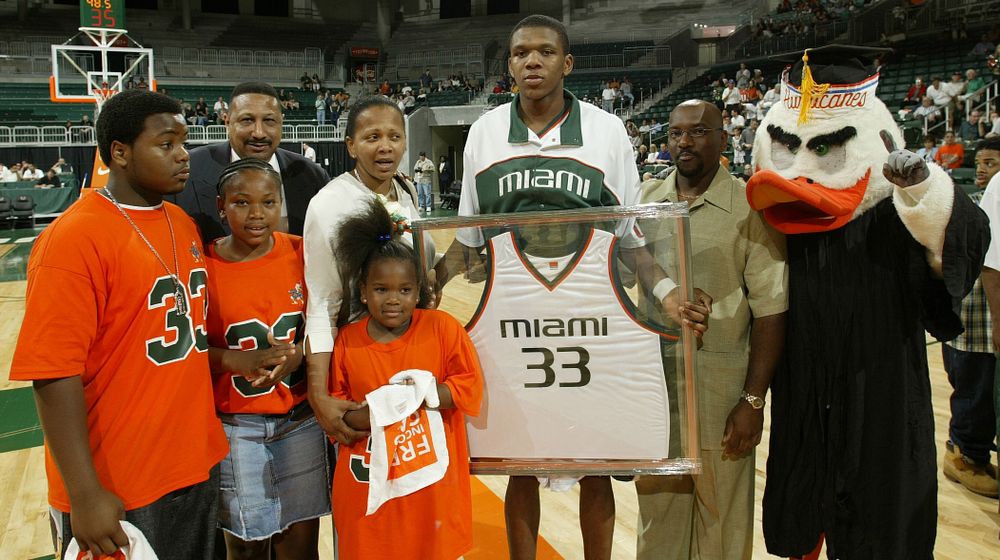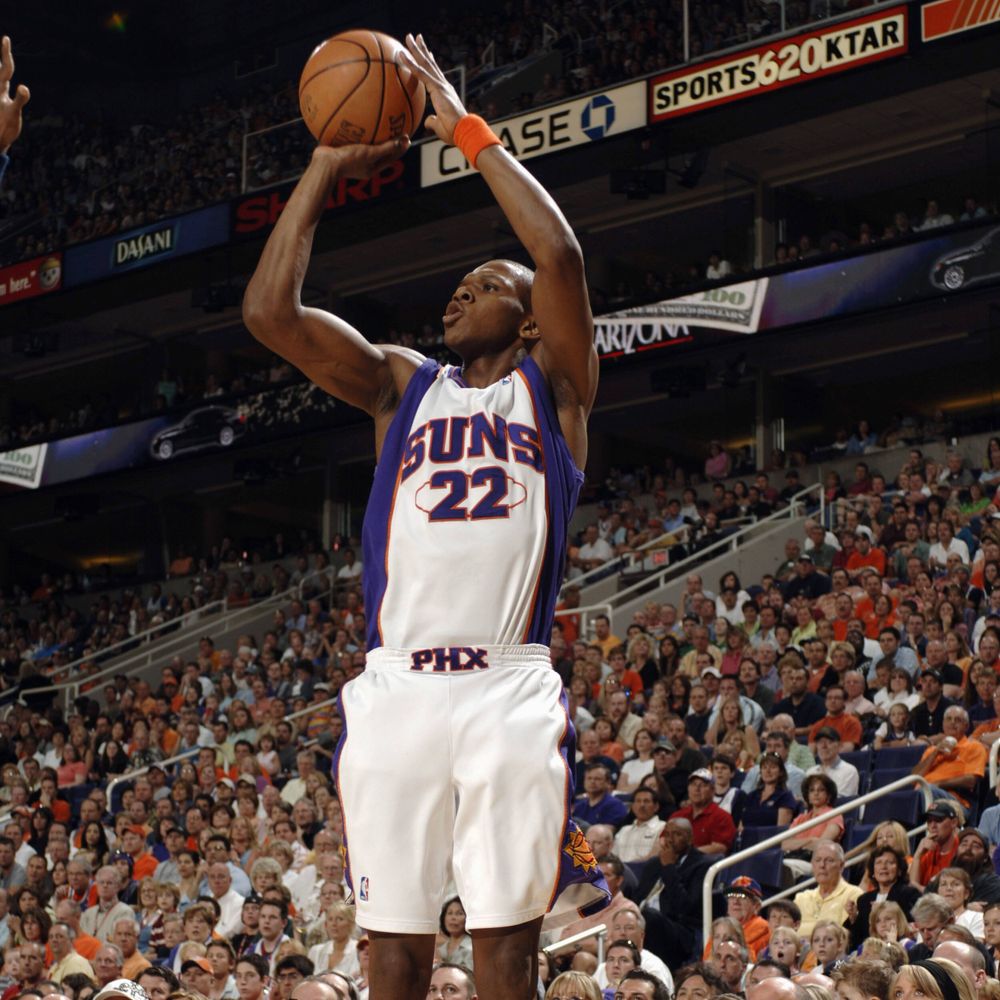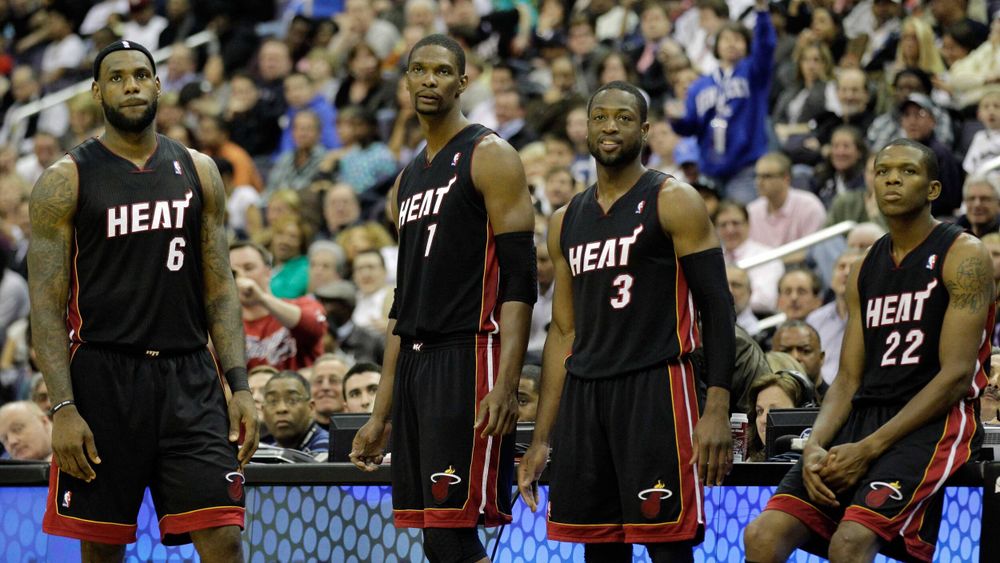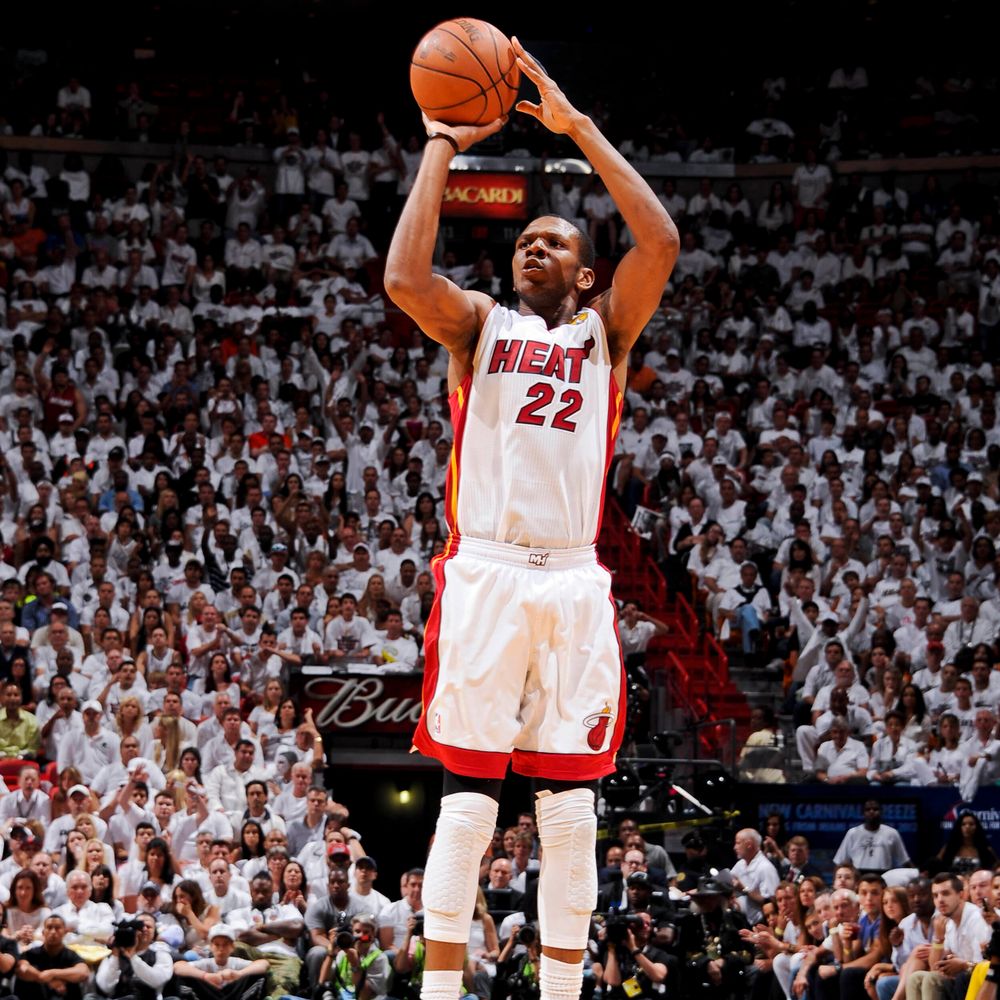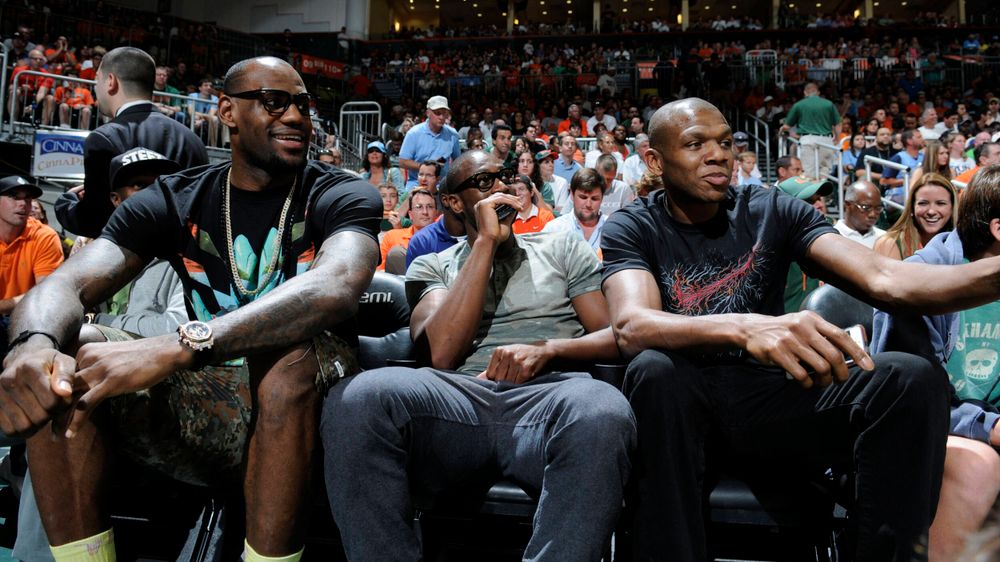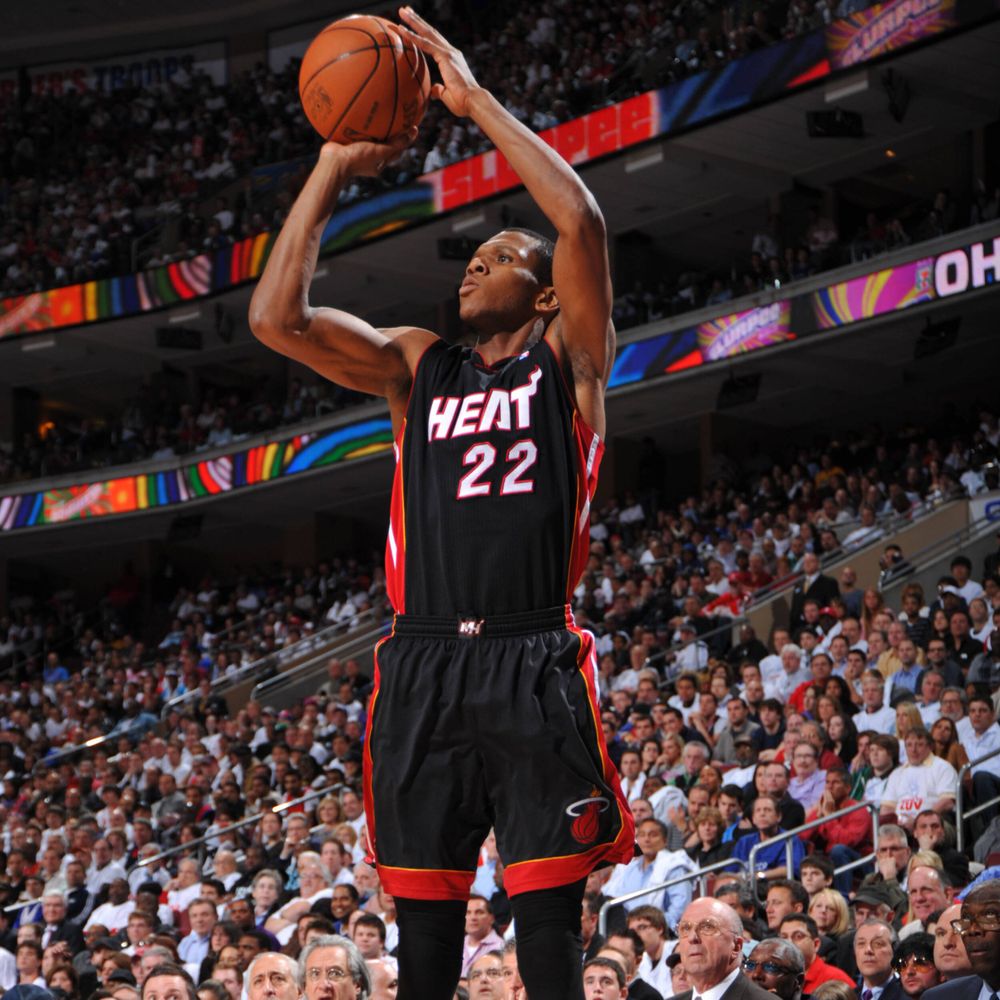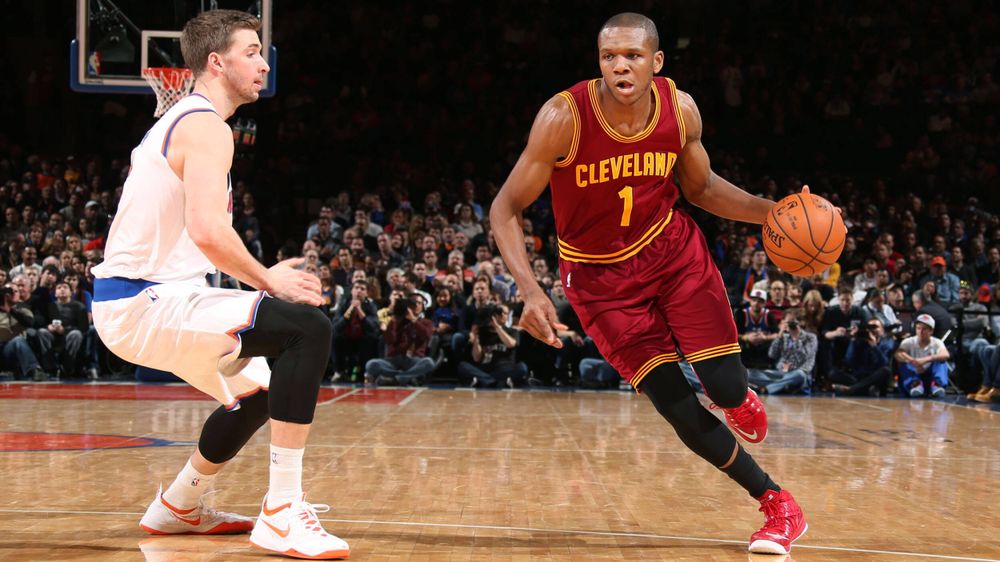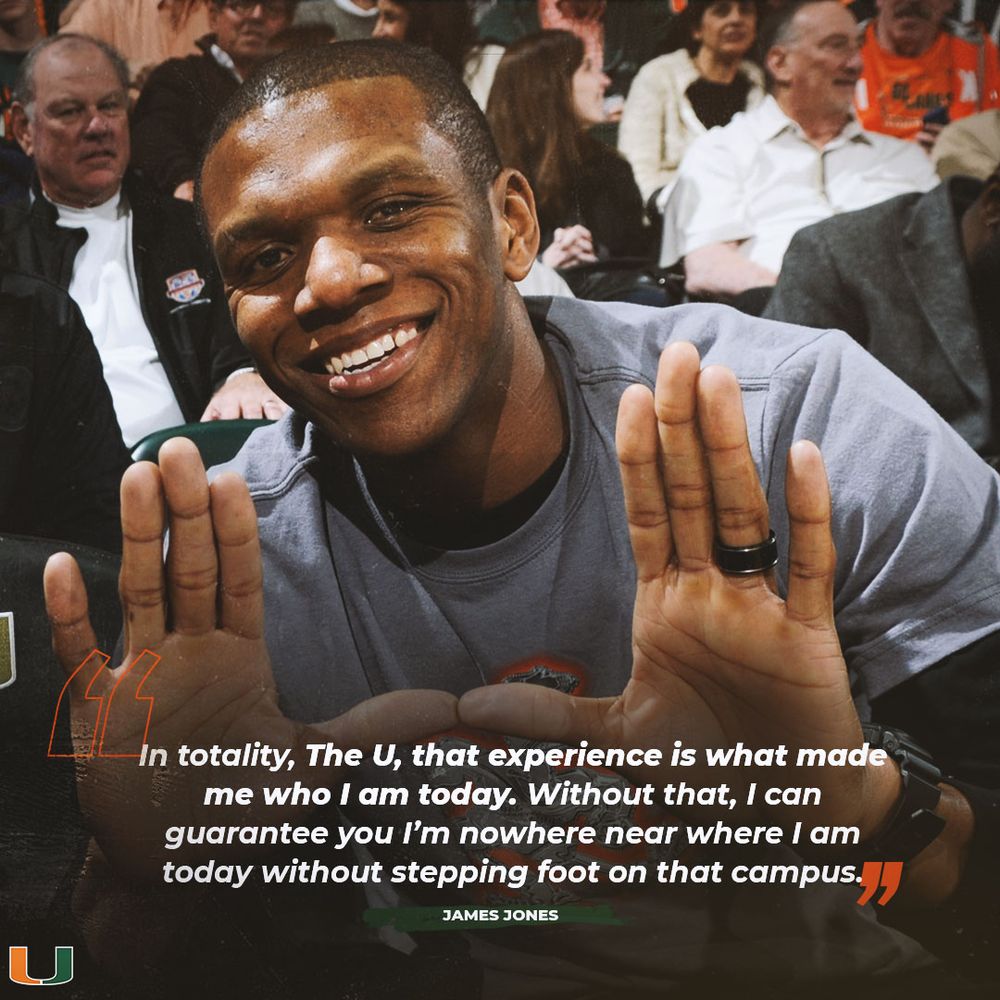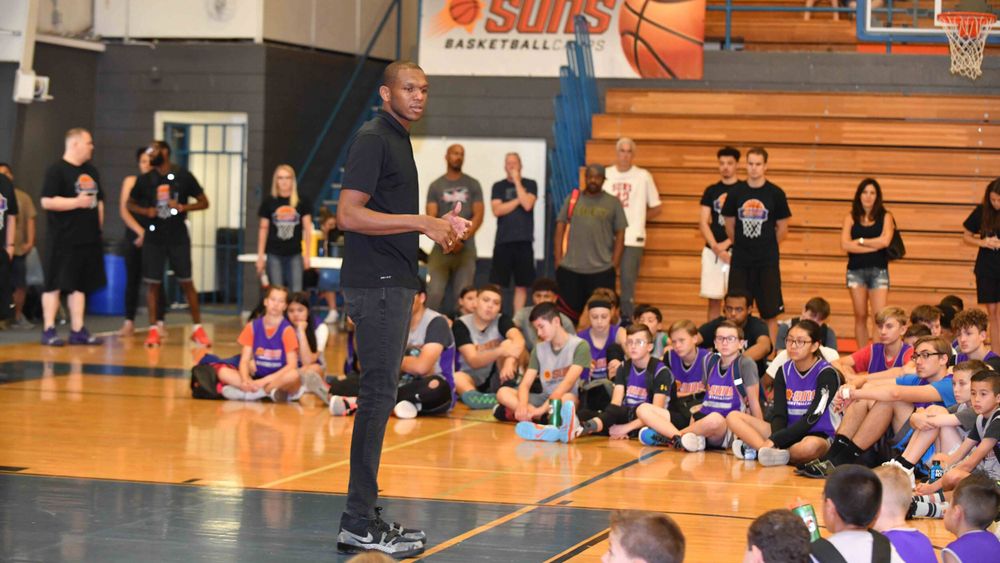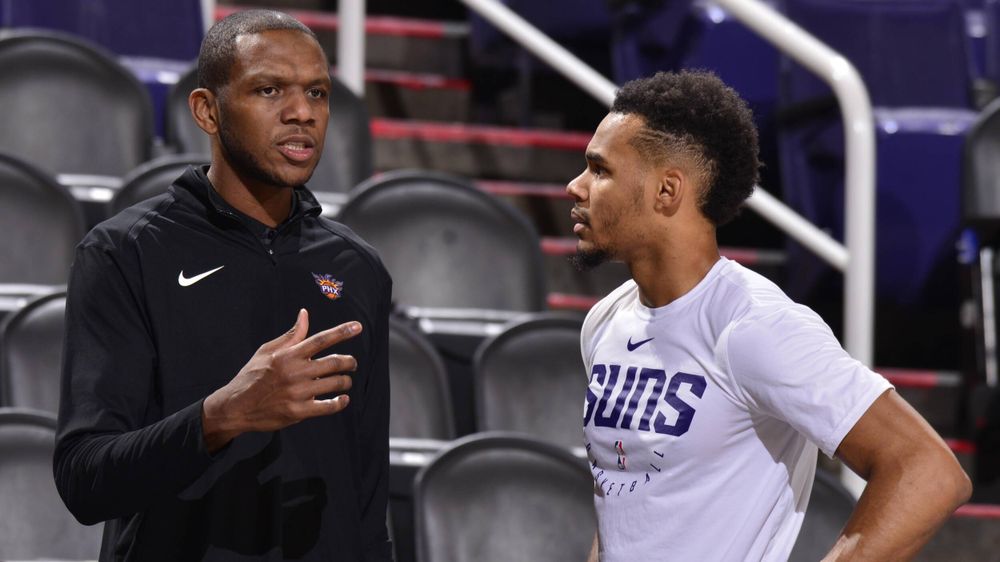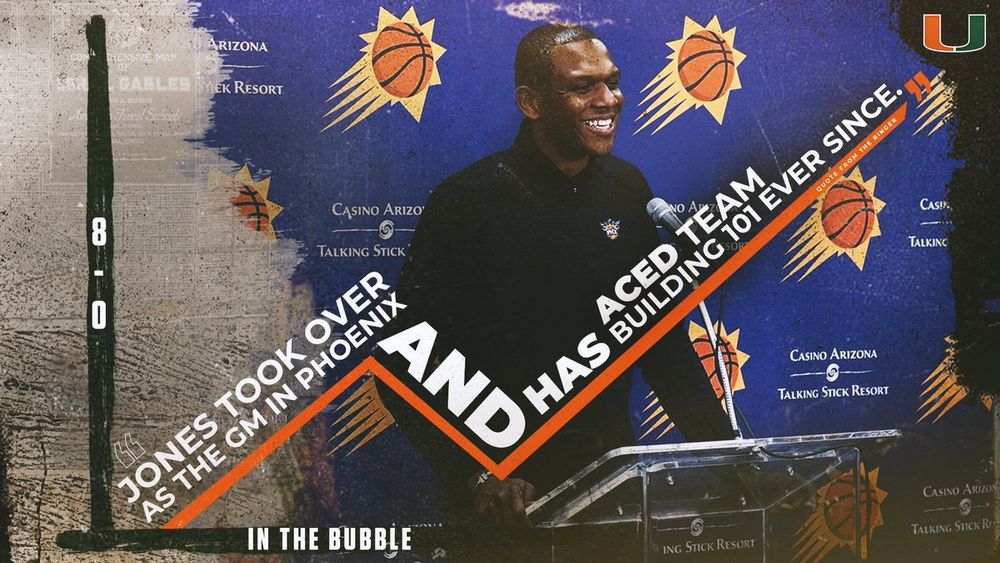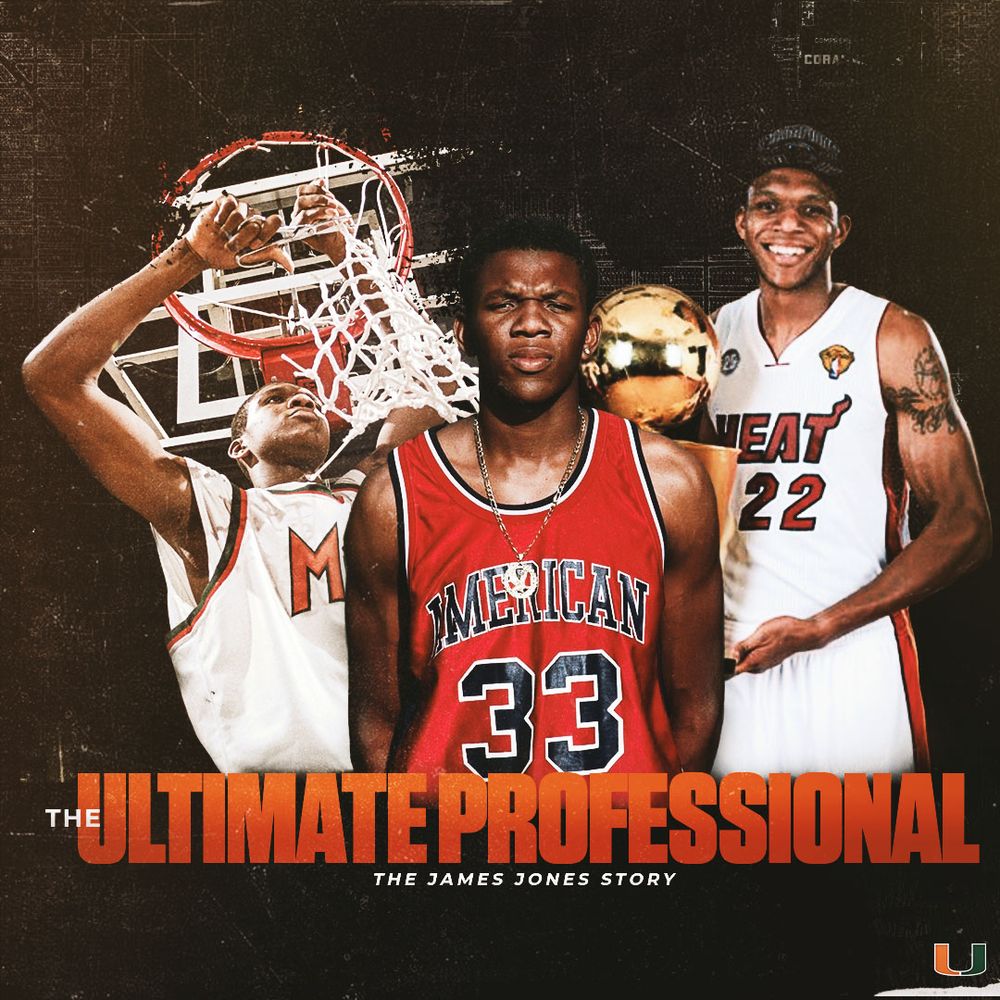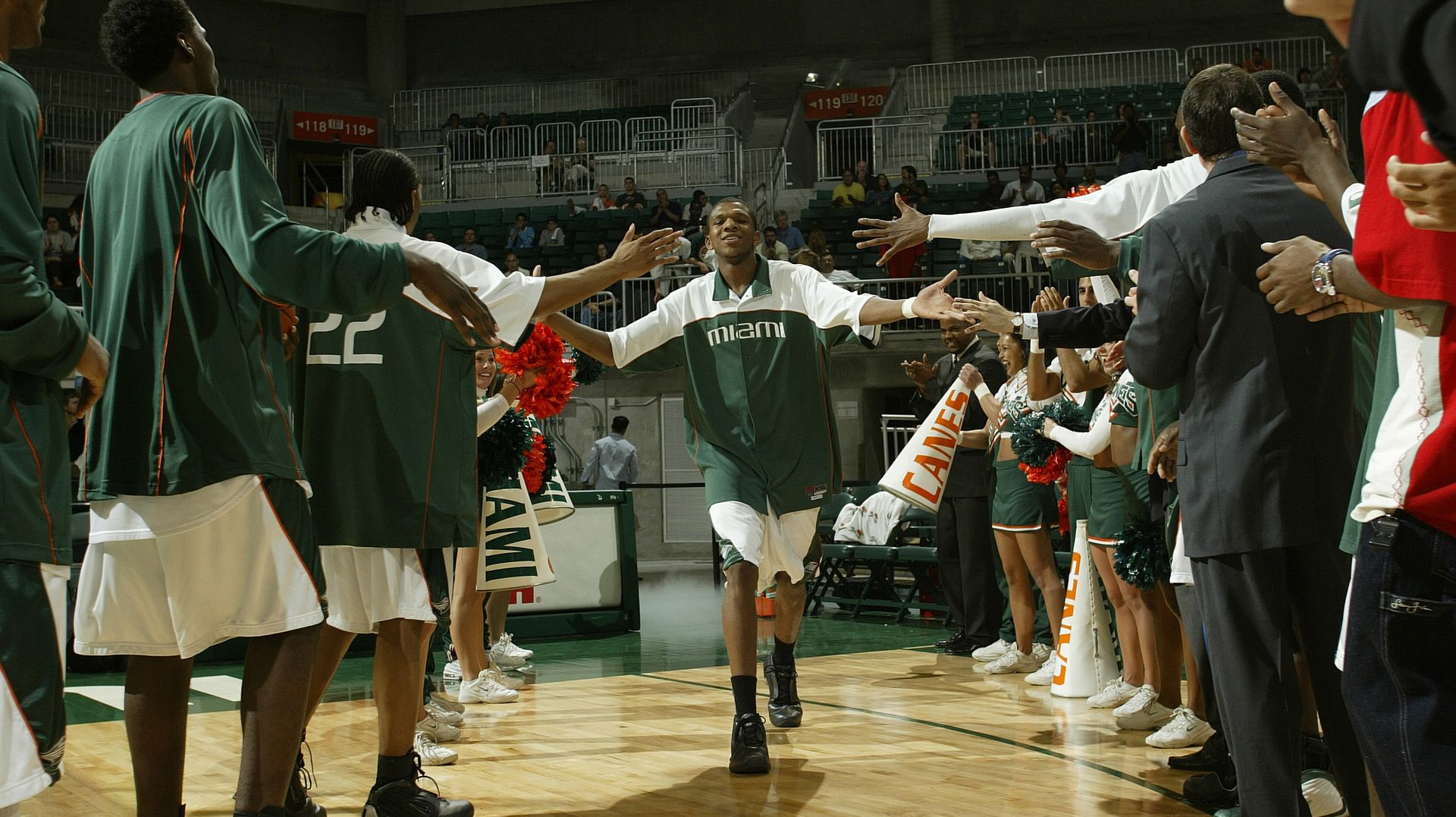
The Ultimate Professional
CORAL GABLES, Fla. – LeBron James considers him his favorite teammate.
Kevin Love labels him his best one.
Mike Miller calls him ‘Champ’ and says he “easily could be the number one teammate I’ve ever had.”
“Him” is James Jones, one of eight men in history to reach the NBA Finals at least seven years in a row.
A Carol City, Fla., native who starred at the University of Miami before claiming three NBA titles—including a pair with the hometown Miami Heat—Jones is now the general manager of the Phoenix Suns.
The 2014 UM Sports Hall of Fame inductee has a resume filled with accomplishments at every level of the sport, but his reputation undoubtedly exceeds his success on the hardwood.
Jones’ basketball journey, you see, is about far more than his lethal 3-point stroke.
It is about how he was an invaluable member of every organization he was part of. It is about how he was the guy everyone loved playing with. It is about how someone with 93 starts in a 14-year career earned carte blanche to play however long he wanted.
It is about how a person, in a matter of weeks, goes from role player to front-office official and, under two years later, to general manager. It is about how so many people have the utmost confidence he will succeed in that position despite his limited experience.
It is about how someone becomes, as Naismith Hall-of-Famer Bob McAdoo puts it, “the ultimate professional.”
* * * * * * * * * * * * * * * * * * * * * * * * * * * * * * * * * * * * * * * * * * * * * * * * * * * * * * * * * * *
When Jones was about seven years old, his mother, Jennifer Jones Harris, came to him with a question.
The church the family belonged to created a small children’s ministry, but had trouble getting the kids to pay attention. Jones Harris had the idea to order Bible stories on VCR tapes to play for them, hoping it would help keep their focus.
They needed a television, though, and Jones Harris knew just where to go.
“I said, ‘James, sometimes we should share. And so, in order for us to get these things done, is it okay if—even though we had other TVs in the house—we take this TV that is your TV to the children’s ministry?’” Jones Harris recalled. “He looked at me [with his head] cocked sort of, but he said yes. Always an obedient kid.”
That was just one of the lessons Jones learned from his mother on how to be selfless.
She taught him to offer people rides and umbrellas when they were outside in the rain. She taught him to help people in a stalled car get their vehicle out of the street and then find a way to get them gas or a tow.
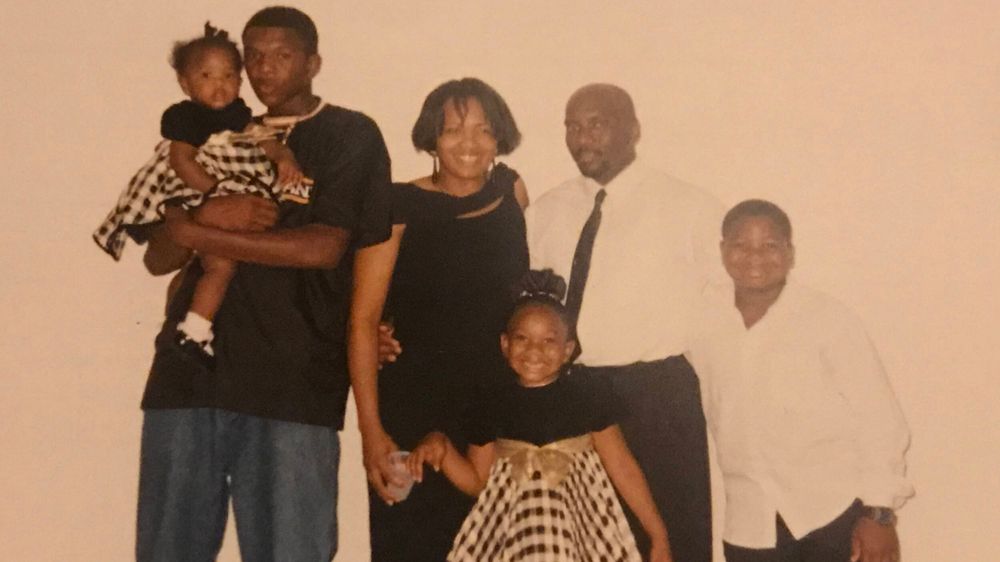
Jones with, left to right, his half-sister, Silver; his mother, Jennifer; his half-sister, Jade; his stepfather, Earl; and his stepbrother, Brandon
Jones Harris instilled values in her son that would, eventually, help him become the person and player he is known for being today.
“She raised me as a single mom until the age of 10 and, for me, those were the years I think shaped me as a man and a human being. Spending every night with my mom,” Jones said. “My mom was a corrections officer working for Miami-Dade Corrections, so she spent a lot of time in the jail and she was a rehabilitator. She helped people get their lives together. She led people, she mentored, she guided.”
Jones Harris, who worked in corrections for 25 years until her retirement in 2012, credits her father, Willie Jones Sr., for providing her with many of the values she passed along to her son.
Understanding the significance of treating others equally was something Jones Harris, the middle of seven children, learned from a young age.
Between her childhood and her job, she simply came to comprehend people in a way that few others do.
“Once I got into corrections, a lot of it got to be problem-solving and the conversation and some of the relationship dynamics,” Jones Harris shared. “Even though you’re dealing with people who have obviously had problems with authority, etcetera, [those] were not social restraints to me because I think being in a large family, you’re just going to experience a whole lot of dynamics.”
Jones’ takeaways from his mother’s life experiences directly contributed to his future success as a teammate.
There is no question Jones grasped from his early days the way one has to interact with others, a knack that has served him well throughout his life.
“There’s a skillset, there’s a way of operating, there’s a way of leading that you can’t get unless you’re in it and my mom was able to give that to me, on a human level,” Jones shared. “That’s why I talk so much about people on a human level—because she has a Ph.D., in helping people and, at the end of the day, that’s all sports is. It’s helping people achieve a common goal.”
* * * * * * * * * * * * * * * * * * * * * * * * * * * * * * * * * * * * * * * * * * * * * * * * * * * * * * * * * * *
It was people, actually, that proved key in Jones’ decision to remain in South Florida for his college career. Not surprisingly, it was one person in particular, his mother, who helped lead him to that choice.
In doing so, Jones Harris displayed the altruism so vital in her life, as well as the same attribute so essential in her son’s.
“I leaned in and that was [to say], ‘Hey, you mean so much. You’re such a conspicuous role model, even in our family. Yes, you could go away, but would you consider staying close so that there is somebody tangible, touchable nearby who we can kind of root for, come see? … It would be for your cousins, your male cousins, primarily,’” Jones Harris said. “Because I’m a jailer and, of course, there are more male inmates in jail. That’s one of the things that I considered [and talked to him about] was, ‘Would you consider [staying close to] home? We could all support you. We’d all be near and then you wouldn’t be somebody that they know who left, but you’re so close, they can’t say that. You’re somebody they know that’s within arm’s reach, perhaps as a source of motivation to them.’”
Jones Harris will not quite go as far as to say her words were the reason her son decided to stay local, but he did indeed choose to do so.
The American Senior High School graduate enrolled at The U in the summer of 1999, joining a burgeoning program in Coral Gables.
* * * * * * * * * * * * * * * * * * * * * * * * * * * * * * * * * * * * * * * * * * * * * * * * * * * * * * * * * * *
A recruit ranked outside the top 100, Jones served in a reserve role as a freshman on a Miami team that shared the BIG EAST regular season title and reached the Sweet 16.
He played primarily as a big man in 1999-00, averaging just 3.9 points and 1.9 rebounds per game, but his role for the rest of his career was quite different.
Perry Clark came in as Miami’s head coach in 2000 and moved Jones to the small forward spot. From then on, he started 88 of the 89 remaining games in his Hurricane tenure.
“James was adjusting to that [new position] and over his time at Miami, he just got better and better with it because he was so smart handling the basketball,” Clark said. “He could shoot the basketball, he could stretch the defenses, but the biggest thing was his attitude in the locker room. He was a leader and he was the guy that always kept other guys on the straight and narrow by encouraging them by his example in practice and his dedication to the game. You knew he had some very special characteristics.”
Jones tripled his marks as a sophomore, tallying 11.9 points and 5.9 rebounds per game in his first season playing the three.
The following year his numbers went up again, to 12.8 and 6.3, respectively. Finally, as a senior, Jones averaged 16.9 points and 6.0 rebounds per game, garnering Verizon Second Team Academic All-America and Third Team All-BIG EAST distinction.
“James was always a competitively tough young man and because he’s so well-spoken, he’s quiet, he’s unassuming, people took that for granted,” Clark recalled. “But James came up with so many key rebounds for us, he would always wind up playing the best offensive front-line player on the other team. A lot of times if they had a two-guard that was really tall and giving us problems, I could put him on that guy, but defensively, he would take the tougher assignments. I think that people really underestimated when it came to rebounding, driving the ball, finishing at the basket and those sort of things.”
Beyond his stats and on-court performances, Clark also credits the “extremely team-oriented” Jones with helping the younger players on Miami’s roster. One particular individual whom Clark thinks Jones benefitted was Darius Rice.
A McDonald’s All-American, Rice came to Coral Gables one year after Jones and, according to Clark, immediately came under Jones’ tutelage.
"He was a leader and he was the guy that always kept other guys on the straight and narrow by encouraging them by his example in practice and his dedication to the game. You knew he had some very special characteristics." -Perry Clark
Rice, who went on to earn three All-BIG EAST honors and finish top-five on Miami’s scoring list, acknowledges the impact Jones had on his career. In just his early twenties, Jones simply understood how to guide those around him.
“He was the guy that kept us balanced,” Rice said. “If we argued, he’ll come right at me and he’ll tell me, ‘Look, you’re [blowing] up. You need to do this, you need to do that.’ He was a guy I could respect and listen to. He’ll tell you straight up, I didn’t listen to too many people, but I listened to him.
“Just watching him, I knew he would be a GM one day because … was such a leader,” Rice added. “Even when I was a freshman and he was a sophomore, he had that leadership skill. It was just a trait that he naturally had. He didn’t party all night like some of us did. He didn’t hang out with the fellas every night. He would do it just enough to blend in, but he knew who he was and he kept that calm, cool demeanor when things were good and bad. I can respect him for that. He taught me a lot over the years.”
* * * * * * * * * * * * * * * * * * * * * * * * * * * * * * * * * * * * * * * * * * * * * * * * * * * * * * * * * * *
While Jones helped his teammates navigate their way through college, they helped him along his route, as well.
The choice to stay close to home and attend Miami paid off for Jones, though not just because he was near his family. It also helped because he was around others in the same shoes as him.
“Being from Miami, there’s a sense of pride with being a Hurricane and achieving success at the highest level as an Academic All-American in college meant something to my family and it was a sense of pride to them and sense of pride for the community. So, that was my fuel,” Jones said. “It helped me because in the tough times, when I needed motivation because the results weren’t what we wanted or I felt wasn’t on pace to achieve my dream of being an NBA player, all I had to do was just look at my community.
“I could look at my teammates,” Jones continued. “I could look at some of my athlete friends, guys that grew up in Carol City, guys that grew up in North Miami, guys that grew up in the inner cities of Miami all over, South Miami—and I could see my friends. I could see we were all on the same path, journey trying to make it; to make it for ourselves, but also to make it for our family and our community proud.”
Jones also enjoyed the ease of access to see his loved ones, appreciating his ability to hop on a bus after a game to head home and spend time with them.
Had Jones elected to depart the area for college, it certainly would not have been such a simple proposition to see his family.
“That proximity always kept me grounded,” Jones said. “It helped me with that mentality of never get too high, never get too low; always remember that you are where you are because of those that love and support you.”
One of the same words Jones mentioned, Clark also used to describe his star pupil. That word is grounded.
Clark feels it was imperative to Jones commanding the deference from teammates such as Rice and there is no doubt it has continued to serve him well to this day.
“He was a level of consistency; every day at practice you knew what you were going to get. I think … players respect guys that are focused, grounded and down to earth, and James always was that way,” Clark said. “But in order to do that, I’ve always believed you’ve got to be confident in your own ability because you don’t have to try to go out and prove to people how good you are … and change their opinions or thoughts. You just do you and they wind up coming around to your way of thinking and that’s the way James was.”
When Jones left Miami in 2003, he ranked No. 10 in program history with 1,356 points and had an NBA future on the horizon.
He also had four years that helped further transform him as a person.
“In totality, The U, that experience is what made me who I am today,” Jones said. “Without that, I can guarantee you I’m nowhere near where I am today without stepping foot on that campus.”
* * * * * * * * * * * * * * * * * * * * * * * * * * * * * * * * * * * * * * * * * * * * * * * * * * * * * * * * * * *
Jones departed Miami as an NBA prospect, albeit not one with significant hype. His career averages of 11.1 points and 5.0 rebounds per game were good, but not eye-popping, though his 38.3 percent clip from long range did jump off the page.
The 6-foot-8 wing, however, had faith in himself that he would latch on with a team and, beyond that, seize the opportunity once he had it.
“I knew I had the skill set. I knew I had the game, I just didn’t have the name,” Jones recalled. “And so after college it was, ‘Look, I’m going to the NBA. If not the NBA, I will play in Europe. If I don’t play in Europe, I’ll go into finance.’ But, to me, there wasn’t a doubt that I would make it because deep down inside, I knew what I was made of and that no one would outwork me and if I just had a chance, I’d make the most of it.”
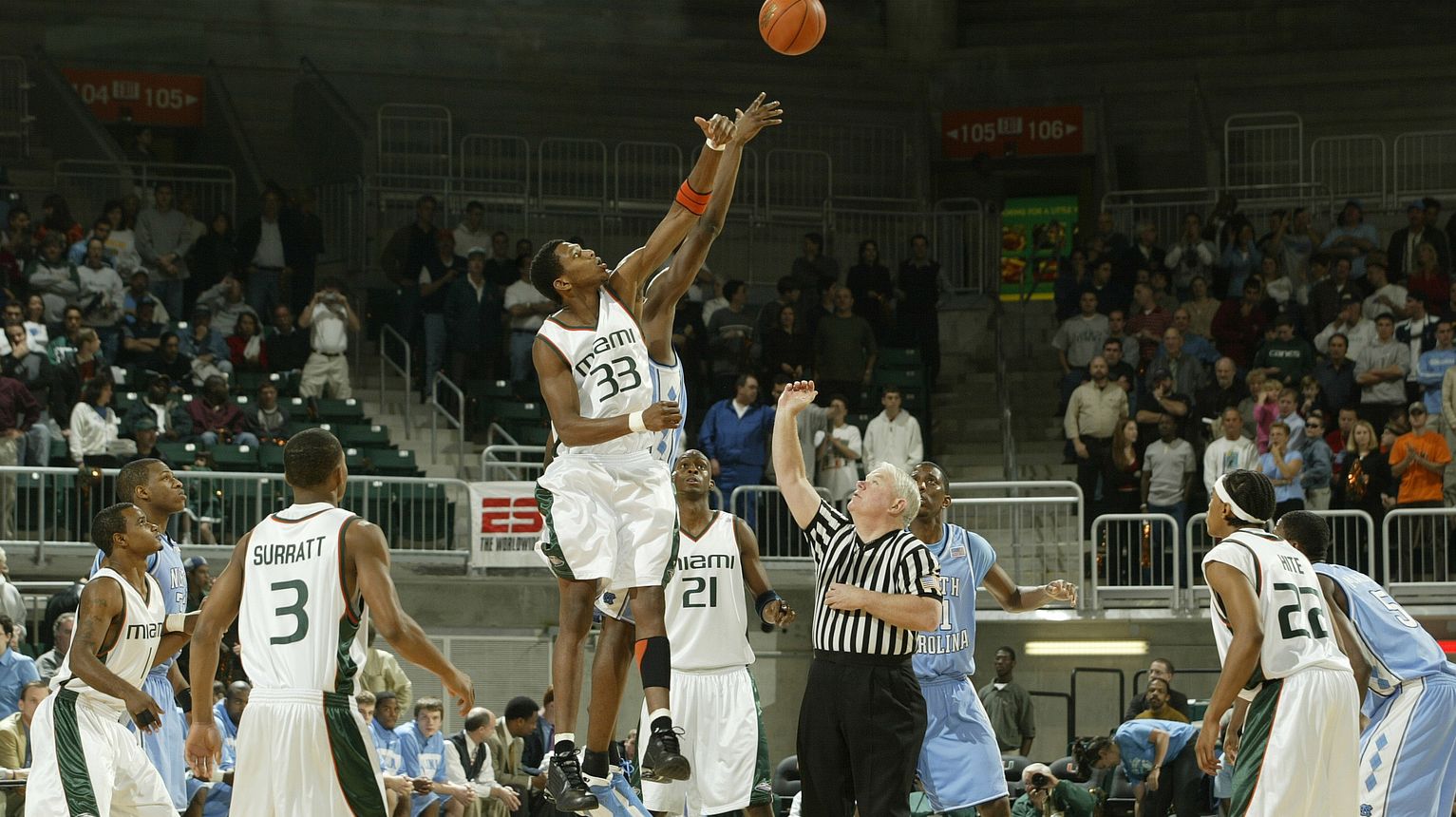
The Indiana Pacers were the first team to give Jones a shot, selecting him with the No. 49 pick in the 2003 NBA Draft, one of the greatest classes in league history.
It proved to be a wise choice by Indiana, as only six players—LeBron James, Carmelo Anthony, Dwyane Wade, David West, Zaza Pachulia and Kyle Korver— in that loaded draft class had longer careers than Jones.
Indiana, however, did not get to reap the rewards of its scouting department’s find. He spent just two years with the franchise, averaging 4.7 points per game and appearing in only six contests as a rookie.
Jones’ time with the Pacers, though, helped him develop into the professional he would become and, beyond that, started a trend of him learning from those around him.
“The greatest benefit for me was being drafted to the Indiana Pacers and being able to be mentored and taught and pretty much raised in basketball and in the NBA my first two years by Reggie Miller,” Jones shared. “…If you track the rest of my career, I was blessed to be with some good organizations, some good leaders and some great teammates, and I just picked things up. I listened, I observed, I watched. I kept my pride and my ego in check and I knew that if I could find my niche, if I could refine and develop an elite skill—for me, which was shooting—if I could guarantee or prove every year that I was the best shooter on the team, that I’d survive.
“There’s no secret,” Jones continued. “Reggie told me when I came in, ‘Never forget that the object of the game of basketball is to put the ball in the basket and if you can do that, you’ll play a long time.’ And it was just that simple.”
The Pacers traded Jones, who indeed became a prominent 3-point marksman, to the Phoenix Suns in 2005, a move that proved significant for Jones a decade later.
He averaged a career-high 9.3 points per game his first year in the desert and appeared in 151 of a possible 162 games over two years.
Another offseason trade put Jones on the move again, this time to the Portland Trail Blazers, for whom he played one year—he shot 44.4 percent from deep—before becoming a free agent.
Able to pick his own team for the first time as a professional, Jones returned home to South Florida and signed with the Miami Heat. One of the greatest runs by any organization in league history soon followed.
* * * * * * * * * * * * * * * * * * * * * * * * * * * * * * * * * * * * * * * * * * * * * * * * * * * * * * * * * * *
During Jones’ time with the franchise, Miami became the fourth team in NBA history to reach the Finals four years in a row and the first since the 1980s. Twice in that span, the Heat claimed NBA crowns.
For as much as LeBron James, Dwyane Wade and Chris Bosh got credit, it took more than those three stars to hoist two Larry O’Brien Trophies. In particular, it took what has come to be known as “Heat Culture,” which Jones played a huge part in forming.
“He knew he wasn’t going to start, he knew he wasn’t going to get a lot of minutes, but he was in that gym constantly working on his game, working on his shot,” McAdoo shared. “And when he got his chance to play, it was almost like he had never been on the bench. He was in shape, he was ready. That’s what I saw in him. He was the ultimate professional when he was with the Heat.”
McAdoo—the 1975 NBA MVP who won two championships during his illustrious career—spent the final six of his 19 seasons as a Heat assistant coaching Jones.
A basketball lifer who has been around the sport at the professional level in some capacity since 1972, McAdoo has seen “not too many” teammates like Jones.
The same goes for Mike Miller, who won two titles with Jones in Miami and spent four total seasons as his teammate, at multiple stops.
“As far as just a guy who sacrifices and cares about the culture and building and winning and things like that and just being a dude’s dude, he’s right there at the top,” Miller said. “He checks every box.”
Jones understood his role on the star-studded Heat extended well beyond the court and, importantly, into the locker room. He immersed himself in learning about his teammates, in helping them on and off the court, in knowing who they were as people.
He arrived at the facility early and he stayed there late. He came in on off-days to watch film and talk with players at the end of the bench. He spent time with teammates in the weight room and the training room, as well as at dinners and breakfasts on the road.
“I think I gained the respect of my teammates because they saw that I was genuine in my approach and my work, and ultimately they knew that I would do anything in my power to help the team win. If that meant playing, great. If that meant wearing a suit, great. If that meant staying late, great,” Jones said. “…What it took to keep our team whole and to contribute to winning, that’s what I was about. And to this day, that hasn’t changed.”
As much as Jones helped mentor younger players on the Heat, he also helped the “big three” of James, Wade and Bosh.
"I was blessed to be with some good organizations, some good leaders and some great teammates, and I just picked things up. I listened, I observed, I watched. I kept my pride and my ego in check and I knew that if I could find my niche, if I could refine and develop an elite skill—for me, which was shooting—if I could guarantee or prove every year that I was the best shooter on the team, that I’d survive." -James Jones
All three of them knew Jones understood the game at a high level and they also saw the amount of hours their teammate put in to hone not only his craft, but that of others.
“His intelligence that he brought to the table was off the charts. The respect—you really don’t see top guys respect guys that are on the bench, but this is what he got when he was with us,” McAdoo said. “He got respect from Dwyane, LeBron and Chris Bosh—and other guys that were on that team—because he was so thoughtful, he was friendly, he knew what he was talking about basketball-wise.”
Added Miller, “The reason ‘Champ’ had that respect from everybody is because he, basically, demanded it of himself. He worked hard. He was honest with everybody. He cared about them. He was genuine when he challenged them, but he challenged them for the right reasons and that gains the respect.”
Jones lives by the motto of being “genuinely, optimally invested” and he clearly displayed that during his six years with the Heat.
During his playing days, he also lived by the philosophy that being in the NBA would not define who he was as a person. That, in turn, paid off for him as a player, as well.
“You spend three hours a day playing games or practicing, but you spend 21 hours a day being human,” Jones shared. “I took that approach of saying, ‘Who am I the 21 hours a day and what do those that I’m closest to—my teammates, my coworkers—who do they think that I am during those 21 hours a day?’ If they think that I’m genuinely invested, I’ll be the ultimate teammate. If they think I’m just there to punch the clock three hours a day, I’ll be a mercenary.”
* * * * * * * * * * * * * * * * * * * * * * * * * * * * * * * * * * * * * * * * * * * * * * * * * * * * * * * * * * *
Although his team-first attitude was a significant contribution to the Heat, Jones also possessed a skill that made him crucial. It was the exact talent he learned to focus on years prior while in Indiana.
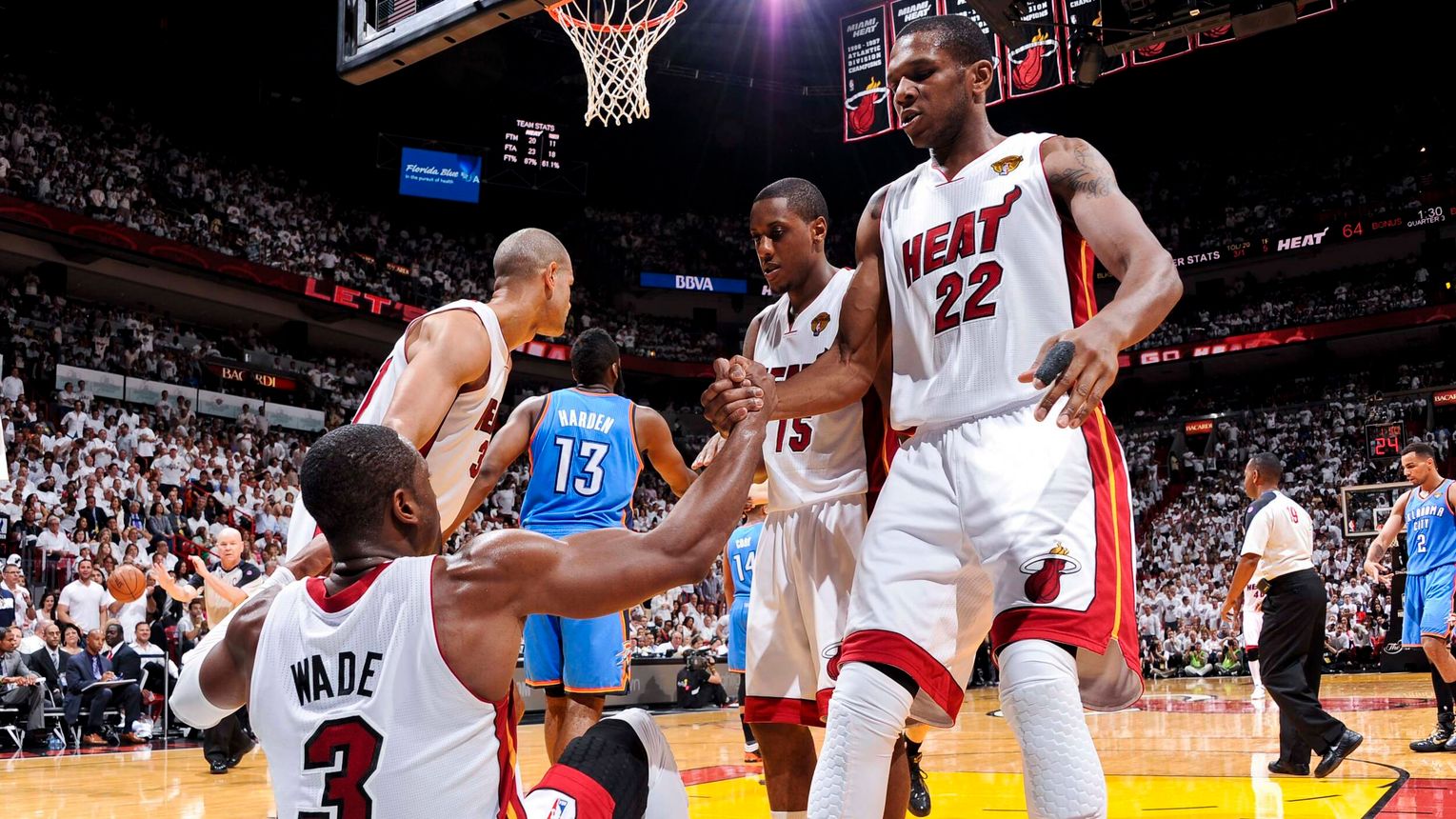
Jones during Game 3 of the 2012 NBA Finals (courtesy of NBA Photos)
Quite simply, Jones had the ability to drill 3-point shots and do so with a consistency that few others in the league possessed. He did it well enough that he won the 2011 NBA 3-Point Contest and, even as he began to age, he could still adeptly let it fly from deep.
That aptitude stemmed directly from his relentless work ethic, the one instilled in him by his mother decades prior.
“I knew I was the best shooter in the building and that was the one thing they couldn’t take away from me,” Jones said. “I know confidence is important and the confidence, for me, comes [through] my work. I truly always felt—and I may be wrong, I may be blinded—but I always felt that I was the hardest-working player on every team I played for since I was a kid.”
Miller saw firsthand Jones’ commitment to his craft. He saw why Jones, who shot 40.8 percent on 694 attempts from 3-point range in six years with Miami, was so assured in his shooting ability.
Both players posted clips of over 40 percent from 3-point range during NBA careers that lasted upwards of a dozen years, so few can better understand Jones’ situation than Miller.
“The crowd expects you to make it every time you touch it and everybody else that’s around the organization expects you to make it; it’s a tough role. And that’s why for guys like us—especially him, I saw it—you shoot thousands and thousands and thousands and thousands of threes in the gym by yourself to make one with 40 million people watching,” Miller chuckled. “It’s a tough task, but that’s why he was great at what he did.”
That confidence and shooting prowess, paired with his ability to challenge his teammates, are among the reasons Miller says Jones meant “everything” to those Heat title-winning teams in 2012 and 2013.
* * * * * * * * * * * * * * * * * * * * * * * * * * * * * * * * * * * * * * * * * * * * * * * * * * * * * * * * * * *
Following his six-year run in Miami, Jones left for the Cleveland Cavaliers in 2014 and played the final three seasons of his career in Ohio, all alongside James.
He went to the NBA Finals each year, adding a third ring to his collection in 2016 when the Cavaliers rallied from a 3-1 deficit to stun the 73-win Golden State Warriors.
Leading up to that seventh game at Oracle Arena in Oakland, Calif., Jones felt good about his team’s chances. Minutes before tip-off, he walked over Cleveland’s director of basketball communications, B.J. Evans, told him he would be an NBA champion in a few hours and then rejoined his teammates in the huddle right before they took the floor.
Later that night, the Cavaliers proved him right.
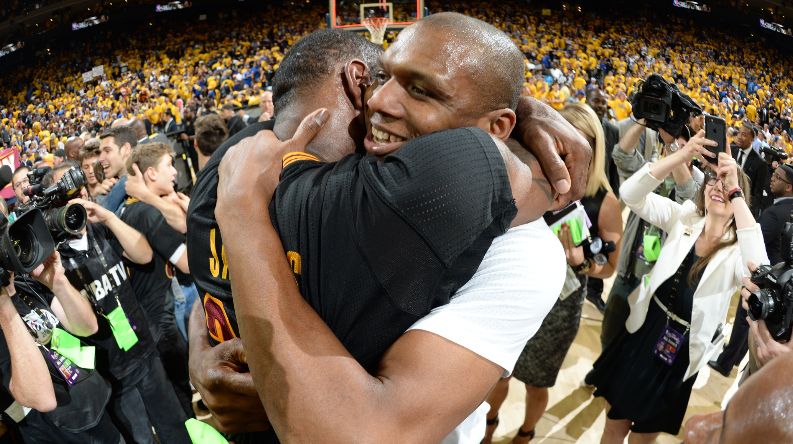
Jones and James after winning the 2016 NBA Finals (courtesy of Andrew D. Bernstein/NBAE/Getty Images)
Mo Williams, a former All-Star, spent just one NBA season alongside Jones, but it was that title-winning campaign with the Cavaliers.
Williams, who was selected two spots before Jones in the 2003 NBA Draft, knows just how important Jones, whom he labels “a leader of men,” was to Cleveland claiming that trophy.
“To win a championship, a lot of things have to go right. You have to have a great locker room. You’ve got be able to keep it stable. He was that voice,” Williams shared. “He was that common voice that kept it stable when adversity hit us and he did a great job of that. And that’s one thing he did really well that I give him a lot of credit for because he had the guys’ respect. When you have the respect, you have their ear.”
One player who certainly gave Jones his ear was Love, a five-time All-Star and two-time All-NBA honoree. He has been as vocal as anyone about the type of teammate Jones was, even sharing a heartfelt Instagram post directed at Jones when he retired in 2017.
Using the former top-five pick as an example, Jones explained how he got to know his teammates and, by doing so, help the collective unit get where it hoped to be.
“[When] your team is going to the Finals, that means you go. And so I just became invested in team and my definition of team is a collection of individuals pursuing a common goal, so I needed to know the individuals,” Jones said. “It started with people first and I just knew they’d know my heart, they’d know my passion, they’d know my intent. And so I could cut to the chase and could just come to someone like Kevin Love and say, ‘Today is not your day and it’s alright. We got you, but you have to be better tomorrow. And this is why you weren’t successful today and this is how you can be better tomorrow. This is just my two cents, take it for what it’s worth, but just know it’s coming from the right place. I want you to be your best.’ Those … are the types of conversations that I would have.”
Williams described Jones as someone others looked to as a coach that season, which McAdoo also said of Jones during his tenure with the Heat.
Although he had the mind of a coach the whole time, Jones still developed through his career. Miller, who played with Jones in both Miami and Cleveland, saw Jones evolve from their first year together in 2010-11 to their final one in 2014-15.
“For guys that last as long as he did in the NBA, you’re going to have to pivot at some point. And ‘A,’ understanding that, and then ‘B,’ doing that, are two different things and he did both of them,” Miller said. “Just because his minutes went down and he became [more of a reserve], didn’t mean the value went down … ‘Champ,’ obviously, like a lot of guys, when you win on those teams, pivoted and made himself someone that was so valuable, you couldn’t get rid of him. And he was huge for everything that we did.”
Jones definitely understood that transformation needed to take place and he did so as well as anyone can.
Although he continued to battle in workouts, it was more to aid those around him than it was for himself.
“By the time I was near the end of my career, [the reason I was there] wasn’t because I was a guy that was playing 28 minutes a game,” Jones said. “It was because I was a guy that brought it in practice and pushed my teammates so that they hit another level, they reached another level, and then when they got in the games, they were unstoppable.”
Pushing those around him is why Jones joined only seven others in knowing what it is like to reach the NBA Finals seven years in a row. Only those eight people—a list that includes LeBron James, Bob Cousy and Bill Russell—know what it is like to play so many games that many years in a row.
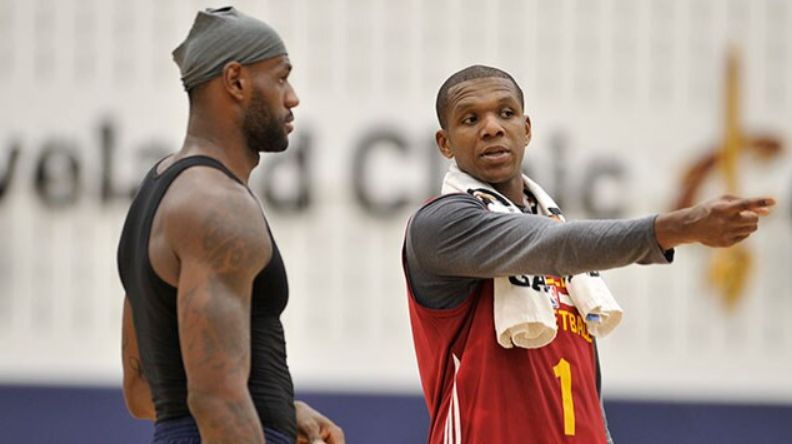
James and Jones at Cleveland's training camp in 2015 (courtesy of David Liam Kyle/NBAE/Getty Images)
To Jones, playing for the ultimate prize seven straight years was primarily centered on two different topics.
One was the commitment it took to make that happen and the yearning to remain there. The other was about seeing hard work pay off.
“It was an exercise in focus and consistency because the higher you climb, the tougher it gets,” Jones shared. “…You reach a high point and then, at some point, you think, ‘Man, I’m going to do everything in my power to make sure I don’t fall because if you fall from here, it’s really, really steep.’ And so, it demands focus, it demands consistency and, for me, it helped me connect the dots. It helped me see that those long hours, those long days, those late nights in the gym, those extra hours, those extra sessions, that just attention to detail, five or six or seven years ago has developed or at least has given me the ability to maintain seven years later.”
If Jones returned to Cleveland in 2017-18, he would have made an eighth consecutive June appearance, putting him in even more select company.
Instead, he went a different way.
* * * * * * * * * * * * * * * * * * * * * * * * * * * * * * * * * * * * * * * * * * * * * * * * * * * * * * * * * * *
Jones always wanted to play 15 years in the NBA. Even from the time he got drafted as a late second-round pick in 2003, that was his goal.
Soon after losing to the Warriors in the 2017 NBA Finals to conclude his 14th season in the league, Jones went to Marco Island, Fla., with his wife and kids. There, he began to think about returning for one final season, to achieve that dream of playing a decade and a half.
“I had to ask myself—mentally, physically, emotionally [if I was ready]. ‘Seven years straight you just went to the Finals and you took that climb and [this year] you failed. Do you have the energy? Can you do it?’ And for the first time in my life, I said, ‘I can, but I’m not really sure I want to,’” Jones recalled. “And that’s all I needed to know. I knew right then and there, if I couldn’t be optimally invested, if I couldn’t bring everything that I had [then I was done]—because to make it to the Finals, to get to that point, you have to bring everything that you have.
“I’m looking at my kids, I’m looking at my wife and I’m like, ‘I don’t [know]. I think I can, but I don’t know if I can,’” Jones continued. “So, at that point, I said, ‘I do know that if I move on to this role with the Suns that I can bring everything to it.’ And so the decision became clear.”
Just 37 days after the Cavaliers’ season ended, Phoenix announced the hiring of Jones, who determined the only reason he would have gone back to play was simply to reach that 15-year mark, as its new vice president of basketball operations. Jones’ playing career was over and the next step in his basketball journey was underway.
Suns owner Robert Sarver said at the time he long had his sights set on hiring Jones to a front-office role, valuing his understanding of what it takes to win an NBA title.
Jones previously served as the treasurer for the National Basketball Players Association (NBPA), so he entered the job with more knowledge of the industry and collective bargaining agreement than most former players.
Beyond that, moving into a front-office position after his playing career was an idea Jones had since his time with the Heat.
“Pat Riley, Erik Spoelstra, Andy Elisburg, Micky Arison—they gave me a master course, master class in how to run an organization because they were open,” Jones said. “They were inviting to help let me understand what it took to lead and to run a team. That was interesting for me because I’m a learner; I always want to learn. So, I think deep in my mind that sparked something in me.”
After just 15 months on the job, Jones was named the Suns’ co-interim general manager in a front office reshuffling.
Six months later, in April 2019, Sarver lifted the interim tag and named Jones the team’s full-time general manager, giving him primary authority over Phoenix’s basketball operations.
“Everything that I’ve done in my life has prepared me for it, but until you’re in it, you don’t know how to apply the skills that you’ve acquired. So, it was quick,” Jones said of the transition. “Fresh from playing, right into the front office [and then] shortly after being a general manager where you’re responsible for so many people and so many things. To this day, I’m still learning.”
Now the head coach at Alabama State University, Williams understands what it is like to go from playing to working within the game in a different capacity.
He feels the virtues that made Jones such an excellent teammate on a championship team will now suit him well in his current role.
“His leadership qualities and his ability to communicate with the 15th person and also the number one priority player on the roster,” Williams said of Jones’ transferrable skills. “[He knows how to be] able to communicate with those types of players and able to relate in a lot of different ways, being a former player. All of those attributes go hand in hand in being a coach and also being an executive, being able to see what you see and being able to relate it and communicate it in a way to get it done.”
McAdoo understands what it is like to work on the front office side of an NBA organization, as he shifted from the bench to a scouting role in 2014.
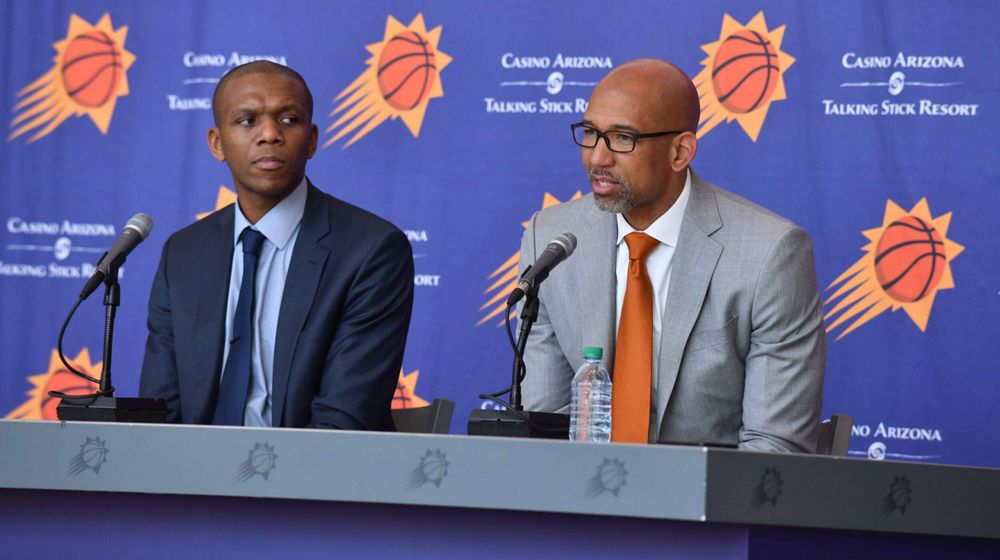
Jones and Phoenix head coach Monty Williams at the latter's introductory press conference (courtesy of Phoenix Suns/Barry Gossage)
The three-time NBA scoring champion also thinks Jones is set up for success with the Suns, as does Miller, who spent two years as an assistant coach at the University of Memphis.
“He’s a very, very intelligent guy. He gets along with everybody. I think getting along with people is the main thing when you’re in a corporation,” McAdoo said. “…I just think he’s going to be a great executive for a long time in this league.”
“He understands everyone in that locker room,” Miller added. “That’s why he’s going to thrive in the new job he has.”
The task for Jones now is utilize all of those tools—the ones referenced by Williams, McAdoo, Miller and so many others—and create the same type of culture from the front office that he did from inside that locker room.
* * * * * * * * * * * * * * * * * * * * * * * * * * * * * * * * * * * * * * * * * * * * * * * * * * * * * * * * * * *
Ten years after the organization traded him to Portland, Jones returned to Phoenix—a city and franchise he felt comfortable with from his past experience there—possessing a specific vision.
“I want to win a title. That’s my goal coming back here, to win a title,” Jones shared. “And I thought, given everything that the city offers, that this would be one of or the place for me if I was going to jump into it, this would be the one place for me to go and try to make that dream a reality.”
Jones has already started to set in motion his plan to take a franchise that has gone a decade without making the playoffs and turn it into a championship contender.
A trusted aide in that process is Jeff Bower, who joined the Suns in April 2019 as the senior vice president of basketball operations.
The former general manager of the Detroit Pistons, Bower has already seen Jones begin to showcase an ability to take the attributes that made him a vital role player and use them as in his new position.
“I think it’s allowed him to have a perspective of seeing how he can best serve the group. His playing experiences were always geared around finding a role that was needed by the team and being consistent in the delivery of the results within that role,” Bower explained. “The role as the leader of basketball operations, that’s a big part of that job and a big part of getting an organization and a department to function effectively. Putting people in the right places and helping them be successful is something that James is very good at.”
In order to turn around any struggling team or company, as Jones is trying to do, one must identify what led to issues and then figure out how to remedy them.
To Bower the primary way Jones has showcased his willingness to learn on the job thus far in his tenure is by doing exactly that.
“The thing that James is very quick to look at is why decisions were made and what was the thinking at the time of the decision and learn from that and understand what the ingredients were that led to the decision,” Bower said. “By doing that, he’s able to understand, for the next time, what our processes are and if they have to be tweaked or changed or totally scrapped in order to the make the best decisions because change is constant.”
Although it is still early, the changes Jones has implemented have already begun to manifest themselves for the public to see.
The Suns’ 34 wins—in just 73 games—in Jones’ first full year as general manager marked their highest total since 2014-15, which was also the last time they finished top-three in their division.
No team generated more buzz in the regular season portion of the NBA ‘bubble’ in July and August than the Suns, who went 8-0 with wins over teams such as the Clippers, Heat, Pacers, Thunder and 76ers.
“The bubble experience gave me a sense of satisfaction because I could see the joy on the faces of the coaches, the staffers, the players that have been grinding away the last couple of years to get us to a point where we’re respected and where we can compete night in and night out, and know that we can win games,” Jones shared. “And so that was gratifying. We just got here by focusing on our people and saying that we wanted to cultivate a character of competitiveness.”
Next up for Jones and the Suns is getting back to the playoffs.
Then comes that climb to the top, the one that takes determination and focus. The one Jones knows so well.
To Bower, who mentioned his boss is “still a huge Hurricane fan,” there is no telling just how much Jones can achieve as a general manager. Maybe he can indeed be the executive to lead Phoenix to its first crown.
“I think the sky is the limit,” Bower said. “…His grasp and understanding of people and the fundamentals of the game are something that is going to continue to be an asset. With his commitment to constant growth and constant learning and constant improvement for the good of the organization, there is really no reason that anything would stop that.”
* * * * * * * * * * * * * * * * * * * * * * * * * * * * * * * * * * * * * * * * * * * * * * * * * * * * * * * * * * *
From Coral Gables, to Indianapolis, to Phoenix, to Portland, to Miami, to Cleveland, now back to Phoenix, Jennifer Jones Harris has followed her son’s success with pride.
“I didn’t know really what to expect, but I believed in him. How his career would unfold is so astonishing to me because he has the three rings, the relationships with those players, the reputation,” she said. “…I am always so delighted in the things that he’s accomplished and, I would say, the favor that’s on his life and how he stays on the straight and the narrow.”
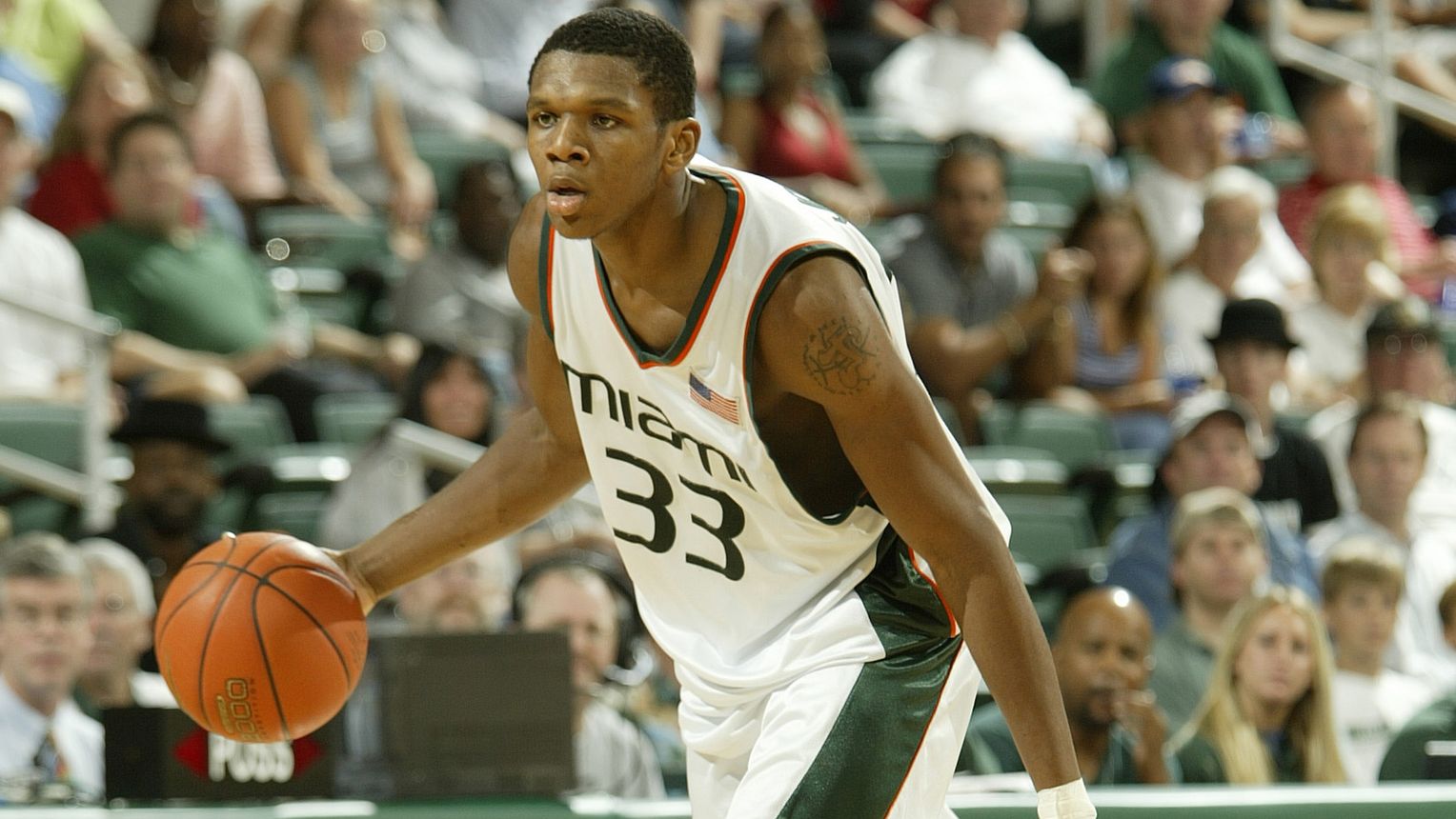
Jones Harris set James on that course from the time he was a child. The lessons she gave him during his youth helped him become a player and person whom others gravitated to and wanted to be around.
They helped him become a revered figure to the greats revered by others. They helped him become the ultimate professional and the ultimate teammate.
They set him on a basketball journey that is, to the man himself, beyond words.
“We all want to say we believe our dreams will come true because we do, but we don’t know it until it happens,” Jones shared. “And so, growing up in Miami, to play for the University of Miami, to play for the Miami Heat, to win multiple championships at home, in my city, that’s special. It leaves me speechless every time I think about it.”
ADDITIONAL CITATIONS
Photos of James Jones with the Indiana Pacers courtesy of NBA Entertainment
Photos of James Jones with the Larry O’Brien Trophy while with the Heat courtesy of NBA Photos
Photo of James Jones with the Larry O’Brien Trophy while with the Cavaliers courtesy of Jesse D. Garrabrant/NBAE via Getty Images
LeBron James on James Jones: https://www.espn.com/nba/story/_/id/14373719/lebron-james-james-jones-unique-bond
Kevin Love on James Jones: https://www.cleveland.com/cavs/2016/06/kevin_love_james_jones_is_best.html
Robert Sarver on James Jones: https://www.nba.com/article/2017/07/19/phoenix-suns-extend-gm-mcdonough-hire-jones
Players with the most NBA Finals appearances: https://www.foxsports.com/nba/gallery/top-10-players-with-most-consecutive-nba-finals-appearances-lebron-james-bill-russell-james-jones-053017


